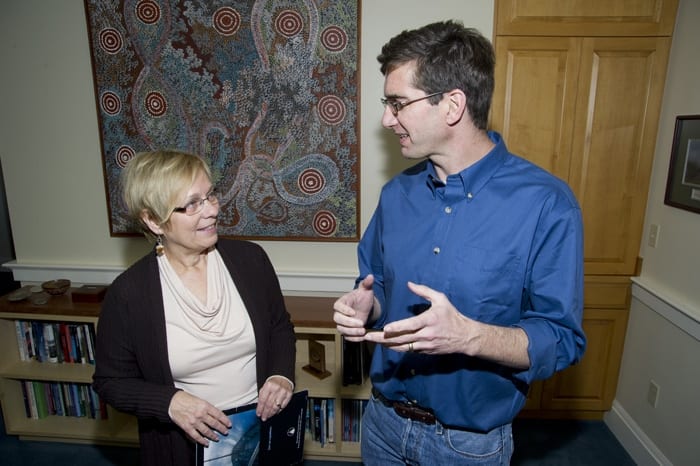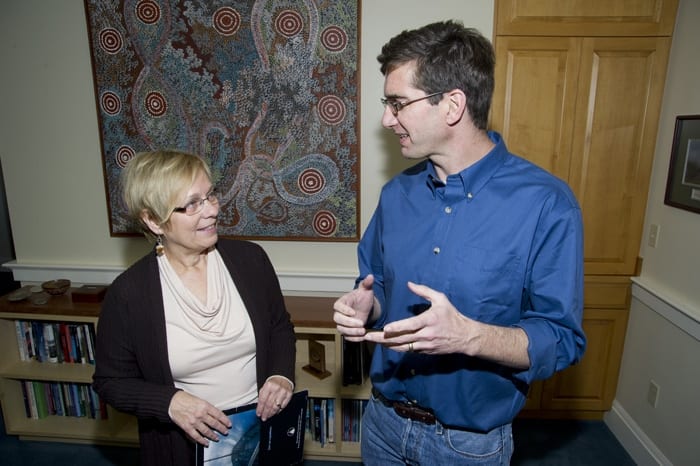WHOI’s Avery, Doney Selected AAAS Fellows
 Newly elected AAAS Fellows Susan Avery, president and director of WHOI, and Scott Doney, senior scientist
(Photo by Tom Kleindinst, Woods Hole Oceanographic Institution)
Newly elected AAAS Fellows Susan Avery, president and director of WHOI, and Scott Doney, senior scientist
(Photo by Tom Kleindinst, Woods Hole Oceanographic Institution) January 11, 2011
Woods Hole Oceanographic Institution (WHOI) President and Director Susan K. Avery and Senior Scientist Scott C. Doney have been elected Fellows of the American Association for the Advancement of Science (AAAS).
In an announcement Tuesday, AAAS said Avery and Doney are among 503 association members chosen by their peers as 2010 Fellows “because of their scientifically or socially distinguished efforts to advance science or its applications.” Recipients will receive their awards Feb. 19 from 8 to 10 a.m. during the 2011 AAAS Annual Meeting in Washington, D.C.
AAAS officials cited Avery “for distinguished leadership of the University of Colorado, Boulder, and the Woods Hole Oceanographic Institution” and Doney “for fundamental contributions to our understanding of the ocean carbon cycle and its interactions with the Earth system and for his scientific leadership. “
“Recognition by one’s professional peers is always humbling, especially when they represent all fields of science,” Avery said. “As our world becomes ever more globally connected, physically, socially, and economically, it is more important than ever to recognize science’s role in understanding our planet as one interdependent system. I am privileged to help promote the benefits of science, and I am deeply honored to be named a AAAS Fellow.”
Doney, a marine geochemist, said, “I am honored to be selected for this award by my peers, and I’m especially thankful to all of my colleagues that have contributed to my research and made this possible.”
Avery took office as president and director of WHOI on Feb. 4, 2008. She is the ninth director in the institution’s 81-year history, and the first woman to hold the position.
As an oceanographic leader with a background in atmospheric research, Avery has used her unique position to underscore the importance of ocean-atmosphere interactions in understanding whole Earth systems. Since taking the helm at WHOI, Avery has delivered Congressional testimony and presentations at scientific conferences such as the American Meteorological Society, the IEEE International Geoscience & Remote Sensing Symposium, the American Geophysical Union, and the Partnership for Observation of the Global Ocean (POGO), often directing her comments at the intersection of atmospheric, earth, and ocean science.
Avery came to WHOI from the University of Colorado, Boulder, where she was a member of the faculty since 1982, and where she served in interim positions as vice chancellor for research and dean of the graduate school, as well as provost and executive vice chancellor for academic affairs. From 1994-2004, she served as director of the Cooperative Institute for Research in Environmental Sciences (CIRES). There, she facilitated new interdisciplinary research efforts spanning the geosciences while bringing them together with social and biological sciences and helped establish a thriving K-12 outreach program and a Center for Science and Technology Policy Research.
Doney’s research in WHOI’s Marine Chemistry and Geochemistry Department focuses on marine ecosystem dynamics and the role of the ocean in the global carbon cycle. After receiving his PhD from the MIT/WHOI Joint Program in 1991, he returned to WHOI in 2002 following 11 years in the Advanced Study Program and Climate and Global Dynamics Division at the National Center for Atmospheric Research in Boulder, Co. Doney is a Leopold Leadership Program Fellow and a Fellow of the American Geophysical Union. He is the recipient of the James B. Macelwane Medal, and is the W. Van Alan Clark Sr. Chair at WHOI. He received a bachelor’s degree in chemistry from Revelle College at the University of California, San Diego, in 1986.
Confirmation of Doney’s recent nomination as Chief Scientist of the National Oceanic and Atmospheric Administration (NOAA) is pending.
The tradition of AAAS Fellows began in 1874. Currently, members can be considered for the rank of Fellow if nominated by the steering groups of the Association’s 24 sections, or by any three Fellows who are current AAAS members (so long as two of the three sponsors are not affiliated with the nominee’s institution), or by the AAAS chief executive officer.
Each steering group then reviews the nominations of individuals within its respective section and a final list is forwarded to the AAAS Council, which votes on the aggregate list.
The Council is the policymaking body of the Association, chaired by the AAAS president, and consisting of the members of the board of directors, the retiring section chairs, delegates from each electorate and each regional division, and two delegates from the National Association of Academies of Science.
The Woods Hole Oceanographic Institution is a private, independent organization in Falmouth, Mass., dedicated to marine research, engineering, and higher education. Established in 1930 on a recommendation from the National Academy of Sciences, its primary mission is to understand the ocean and its interaction with the Earth as a whole, and to communicate a basic understanding of the ocean’s role in the changing global environment.

